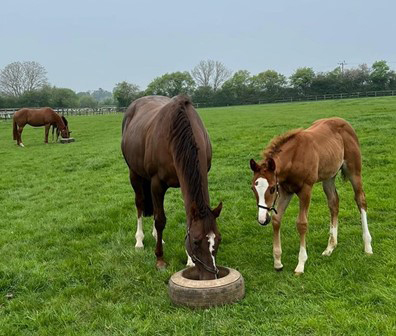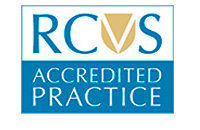24 hour contact: 01707 666297
Born to run? New RVC study reveals link between early-life experiences and later-life performance in Thoroughbreds
New research conducted by the Royal Veterinary College (RVC) has revealed that Thoroughbred foals that are given extensive turnout in larger pastures during their first six months of life, and those weaned later, are more likely to go on to race, compete more often, and earn more prize money.

This is the first time in a UK field setting that the effect of early-life exposures, in particular exercise and turn out, on later-life milestones and race performance in Thoroughbreds has been comprehensively evaluated. These novel findings can be directly applied at stud farms to help retain Thoroughbreds within the industry and achieve their maximum athletic potential - outcomes that align with priorities of the Horse Welfare Board’s strategy to support the welfare of horses bred for racing.
Conducting the research, the team, led by Dr Rebecca Mouncey, a Veterinary Surgeon and Post-Doctoral Research Fellow at the RVC, followed 129 flat race bred Thoroughbred foals, born in 2019 and 2020 on six stud farms across the UK, from birth into training for racing. Each dam’s reproductive history, and details of her health and management during pregnancy were collected, as were daily records of the foal’s health and management from birth until they left the stud farm. Race performance records up to the end of their fourth year of life were collated from racing industry databases.
The team then used statistical modelling to evaluate relationships between gestational exposures and early-life experiences and whether or not horses entered training and their subsequent race performance. Findings suggested that the use of more extensive turnout practices during the first six months of life and later weaning benefited the attainment of career milestones, productivity (the number of races) and financial returns (total prizemoney won).
Key findings include that:
- Foals that spent more time turned out at pasture in the first six months of life, and foals that were weaned at an older age, were more likely to race at least once by the end of their fourth year of life.
- The older the foals were at weaning, the greater number of race stats they made.
- Foals that were turned out in larger paddocks during the first six months of life earned more prizemoney.
Published in Equine Veterinary Journal, these findings demonstrate that the first six months of life is a critical period of development in Thoroughbreds, during which it is essential that turnout and weaning practices provide sufficient opportunity for positive tissue adaptation and optimal development. Breeders are therefore encouraged to maximise turnout whenever possible, and to consider weaning after this critical period.
Dr Rebecca Mouncey, Veterinary Surgeon and Post-Doctoral Research Fellow at the RVC, said:
“This study is the first of its type to evaluate the effect of early-life experiences on later-life performance in Thoroughbred racehorses, providing important novel findings that can be directly applied at the stud farm level to reduce wastage and improve performance in this population. “Our findings highlight that the first six months of life are a critical period of development in Thoroughbreds, during which we must be mindful to ensure that our management practices provide sufficient opportunity for positive tissue adaptation and optimise development.”
This research was funded by the Horserace Betting Levy Board, the Racing Foundation and the RVC’s Mellon Fund for Equine Research.
Notes to Editors
Reference
Mouncey R, de Mestre AM, Arango-Sabogal JC, Verheyen KL. Born to run? Associations between gestational and early-life exposures and later-life performance outcomes in Thoroughbreds. Equine Vet J. 2025.
The full paper can be accessed at: https://doi.org/10.1111/evj.70084
This research was funded by the Horserace Betting Levy Board (EPDF 2022-9 and VET/PRJ/791), the Racing Foundation and the RVC’s Mellon Fund for Equine Research.
For more information about this research, visit the project website at: Early-life determinants of performance and the Economics of Thoroughbred breeding
To view other publications from this project visit: The Thoroughbred birth cohort - Google Scholar
For more information about the RVC’s Equine Practice, visit: https://www.rvc.ac.uk/equine-vet/practice
For media enquiries, please contact:
- rvc@plmr.co.uk
- Press Line: 0800 368 9520
About the RVC
- The Royal Veterinary College (RVC) is the UK's largest and longest established independent veterinary school and is a Member Institution of the University of London.
- It is one of the few veterinary schools in the world that hold accreditations from the RCVS in the UK (with associated recognition from the AVBC for Australasia, the VCI for Ireland and the SAVC for South Africa), the EAEVE in the EU, and AVMA (probationary) in the USA and Canada.
- The RVC is ranked as the top veterinary school in the world in the QS World University Rankings by subject, 2025.
- The RVC offers undergraduate and postgraduate programmes in veterinary medicine, veterinary nursing and biological sciences.
- The RVC is a research-led institution, with 88% of its research rated as internationally excellent or world class in the Research Excellence Framework 2021.
- The RVC provides animal owners and the veterinary profession with access to expert veterinary care and advice through its teaching hospitals and first opinion practices in London and Hertfordshire.

